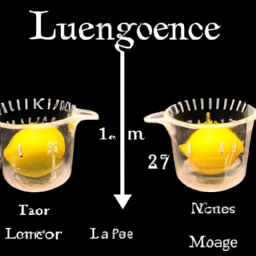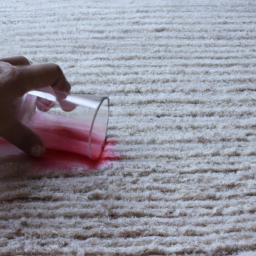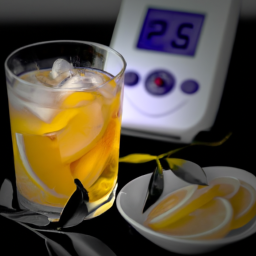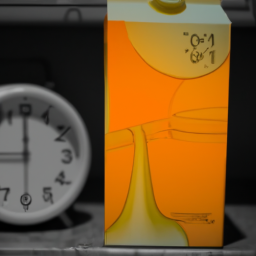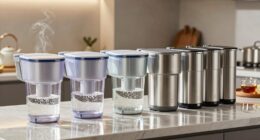As someone who loves to cook and bake, I recognize the importance of accurate ingredient measurements.
One ingredient that can often be tricky to measure is lemon juice. Recipes often call for specific amounts of lemon juice, such as 1/4 cup, but how many lemons does it take to produce that amount?
In this article, we will explore the science behind measuring lemon juice and provide tips for getting the most juice out of your lemons.
We will also discuss alternative sources of lemon juice and how to store leftover juice.
By understanding the importance of accurate measurements and knowing how to properly juice lemons, you can elevate your culinary creations and impress your family and friends with delicious dishes and desserts.
Key Takeaways
- A single lemon contains about 2-3 tablespoons of juice on average.
- Factors affecting the amount of juice in a lemon include size, ripeness, and juicing method.
- To obtain a cup of lemon juice, about 5-6 lemons are needed on average.
- Accurately measuring lemon juice is essential in cooking to affect the taste of the dish.
Understanding the Importance of Accurate Lemon Juice Measurements in Cooking and Baking
If you want your dishes to turn out just right, it’s crucial to get the right amount of lemon juice – and that means understanding the importance of accurate measurements! The science behind lemon juice acidity plays a big role in cooking and baking.
Lemon juice is highly acidic, with a pH level of around 2.0, and this acidity can affect the outcome of your dish. For example, too much lemon juice can cause dairy products to curdle, while too little can make your dish taste bland. It’s important to measure lemon juice accurately to ensure the right balance of acidity in your dish.
In addition to its role in flavor, using lemon juice as a natural preservative is also a common practice in cooking and baking. The high acidity of lemon juice can help prevent spoilage and bacterial growth in foods, making it a great option for preserving fruits and vegetables.
Knowing how much lemon juice to use can help preserve your food and extend its freshness. So, now that we understand the importance of accurate measurements, let’s dive into the average amount of juice contained in a single lemon.
The Average Amount of Juice Contained in a Single Lemon
You’ll be surprised by how much citrus goodness you can extract from just one of these little guys! On average, a single lemon contains about 2-3 tablespoons of juice. But the amount can vary depending on factors such as the size of the lemon, its ripeness, and how it is juiced.
When you find yourself with more lemon juice than you need for a recipe, don’t throw it away! There are many uses for excess lemon juice, such as making salad dressings, marinades, and cocktails. Some recipes require precise amounts of lemon juice, such as lemon curd or lemon meringue pie, so it’s important to measure accurately.
With a little practice, you’ll soon be able to judge how many lemons you need for your recipes and how much juice each lemon will yield.
Factors that can affect the amount of juice in a lemon include its size, ripeness, and the method used to juice it.
Let’s explore these factors in more detail to better understand how to get the most juice out of our lemons.
Factors That Can Affect the Amount of Juice in a Lemon
To get the most juice out of your lemons, it’s important to consider factors like their size, ripeness, and the juicing method used. The amount of juice you can extract from a lemon can vary depending on these factors.
For instance, smaller lemons tend to have less juice than larger ones, while ripe lemons are juicier than unripe ones. Additionally, the flavor of the lemon can also be affected by these factors. A ripe lemon tends to have a sweeter and less acidic taste compared to an unripe one.
This means that the amount of juice you extract from a lemon can also affect the taste of your cocktails or any dish that requires lemon juice. Therefore, it’s important to choose the right lemons and extract the most juice possible to achieve the desired flavor.
To continue on, knowing how to juice a lemon properly can also make a big difference in the amount of juice you can get.
How to Juice a Lemon
Get ready to feel like a juicing pro with these simple steps for getting the most out of your lemons. First, roll the lemon on a hard surface, like a countertop, before cutting it in half. This will help break down the membranes inside the fruit and release more juice.
Next, use a citrus juicer or your hands to squeeze the lemon halves, ensuring that you apply enough pressure to extract all the juice. Finally, strain the juice through a fine-mesh sieve to remove any seeds or pulp.
Using fresh lemon juice has a multitude of benefits, including adding brightness and acidity to dishes, enhancing flavors, and providing a source of vitamin C. Different ways to incorporate lemon juice in recipes include using it as a marinade for meat or fish, adding it to salad dressings or sauces, or using it to make refreshing drinks like lemonade or cocktails.
With these simple juicing techniques, you can easily incorporate fresh lemon juice into your favorite recipes and enjoy all the benefits it has to offer.
Transitioning to the next section, let’s take a look at how to measure lemon juice in cups and tablespoons.
Measuring Lemon Juice in Cups and Tablespoons
Measuring lemon juice accurately is essential in cooking, as it can significantly affect the taste of the dish. However, not everyone has a measuring cup, and it can be challenging to determine the right amount of juice needed without one. Measuring accuracy is crucial, especially when substituting lemon juice with other ingredients, such as vinegar or citric acid.
To measure lemon juice accurately, you can use a tablespoon or a teaspoon. A tablespoon contains around 15 ml of liquid, while a teaspoon has around 5 ml. The table below shows the equivalent measurements of lemon juice in cups, tablespoons, and teaspoons.
| Cup | Tablespoon | Teaspoon |
|---|---|---|
| 1/4 | 4 | 12 |
| 1/3 | 5 1/3 | 16 |
| 1/2 | 8 | 24 |
| 1 | 16 | 48 |
When substituting lemon juice with other ingredients, keep in mind that vinegar and citric acid are more potent than lemon juice. For example, if a recipe calls for one tablespoon of lemon juice, you can substitute it with half a tablespoon of vinegar or citric acid. With this knowledge, you can now proceed to the next section to determine how many lemons you need for specific measurements of lemon juice.
How Many Lemons You Need for Specific Measurements of Lemon Juice
When I cook, I often need specific measurements of lemon juice. For example, a recipe might call for 1/4 cup of lemon juice, 1/2 cup of lemon juice, or 1 tablespoon of lemon juice. To achieve these measurements accurately, I need to know how many lemons I should use.
In this discussion, I’ll explore how many lemons are needed for these specific measurements of lemon juice.
1/4 Cup of Lemon Juice
To obtain a cup of lemon juice, you’ll need to squeeze the juice from several lemons. On average, one lemon yields about 2-3 tablespoons of juice, so you’ll need about 5-6 lemons to get a full cup. However, factors such as the size of the lemons and how juicy they are can affect the amount of juice you get from each one.
Using lemon juice in both cooking and skincare has numerous benefits. Lemon juice is an excellent source of vitamin C, which helps boost the immune system and promote healthy skin. It also contains citric acid, which can help exfoliate the skin and reduce the appearance of dark spots.
Incorporating lemon juice into your daily routine can have a significant positive impact on your overall health and appearance.
Incorporating a cup of lemon juice into your diet can be a simple and effective way to add a burst of flavor to your favorite dishes or to enjoy the numerous benefits of this citrus fruit.
1/2 Cup of Lemon Juice
You can enhance the flavor and reap the benefits of this citrus fruit by squeezing enough lemons to fill a large glass jar with fresh, zesty juice. Lemon juice is a great source of vitamin C, which is essential for the growth and repair of tissues in our body. It also contains antioxidants that help protect our cells from damage caused by free radicals.
Drinking lemon juice can help boost our immune system, aid digestion, and even lower the risk of developing certain types of cancer. Aside from its health benefits, lemon juice is also great for our skin. It has natural antibacterial and antifungal properties that can help fight acne and other skin conditions. It also contains alpha-hydroxy acids that can help exfoliate dead skin cells and brighten our complexion.
Incorporating lemon juice into our skincare routine can leave our skin looking and feeling refreshed and revitalized. As we move on to discussing the tablespoon of lemon juice, let’s explore how this versatile fruit can be used in various recipes and applications.
1 Tablespoon of Lemon Juice
As I mentioned earlier, a cup of lemon juice can be used in a variety of recipes. But what if you only need a tablespoon of lemon juice? Well, luckily, lemon juice can be easily measured out in smaller quantities.
Aside from its ability to add flavor to dishes, lemon juice also has a number of health benefits. It’s high in vitamin C, which can boost the immune system, and contains antioxidants that can help prevent cell damage. Lemon juice may also aid in digestion and weight loss.
With all of these benefits, it’s no wonder that lemon juice is a popular ingredient in many recipes. When it comes to using lemon juice in recipes, there are countless options. Whether you’re making a savory dish, like grilled chicken, or a sweet treat, like lemon bars, lemon juice can add a bright, refreshing flavor. You can even use it in drinks, like lemonade or a classic gin and tonic.
With so many possibilities, it’s easy to see why lemon juice is a staple in many kitchens. And speaking of using lemon juice, in the next section, I’ll share some tips for getting the most juice out of your lemons.
Tips for Getting the Most Juice Out of Your Lemons
Getting the most juice out of your lemons can be done by using a few simple techniques. First, consider investing in a citrus juicer. These devices are designed to extract the maximum amount of juice from your lemons, and they can save you a lot of time and effort in the process. Simply cut your lemon in half, place it in the juicer, and press down firmly to extract the juice.
Another way to maximize your lemon yield is to roll your lemons firmly on a hard surface before juicing them. This helps to break down the membranes inside the lemon, making it easier for the juice to flow out. Additionally, warming your lemons slightly before juicing them can also help to increase the amount of juice you can extract. Simply microwave your lemon for 10-15 seconds, or place it in a bowl of warm water for a few minutes before cutting and juicing.
When you’ve finished juicing your lemons, you may find yourself with leftover juice that you’re not sure how to store. In the next section, I’ll share some tips for keeping your lemon juice fresh and flavorful for as long as possible.
Storing Leftover Lemon Juice
Maximizing the shelf life of your leftover lemon juice is crucial if you want to enjoy its tart goodness in your recipes for longer. Here are the best storage methods to prevent lemon juice spoilage:
-
Store in an airtight container: Air is the enemy of citrus juice as it speeds up the oxidation process and leads to spoilage. Therefore, it’s best to store leftover lemon juice in an airtight container, such as a glass jar with a tight-fitting lid or a plastic container with a snap-on lid.
-
Refrigerate promptly: Lemon juice should be refrigerated promptly after use to prevent bacterial growth. Ideally, it should be stored in the coldest part of the fridge, such as the back of the bottom shelf.
-
Freeze for long-term storage: If you have a large amount of leftover lemon juice, you can freeze it in ice cube trays and use as needed. Once frozen, transfer the lemon juice cubes to a freezer-safe bag or container and store in the freezer for up to six months.
Now that you know how to store leftover lemon juice properly, let’s explore alternative sources of lemon juice.
Alternative Sources of Lemon Juice
Looking for a tangy alternative to lemon juice? Check out these creative options! While fresh lemon juice is ideal for many recipes, sometimes it can be difficult to find good quality lemons or to squeeze enough juice for a recipe.
In these cases, bottled lemon juice can be a great alternative. Not only is it convenient and easy to use, but it also has a longer shelf life than fresh lemons. Plus, many brands of bottled lemon juice are made from 100% lemon juice, so you don’t have to worry about any added preservatives or artificial flavors.
If you prefer to make your own lemon juice substitute, there are a few options to consider. One popular choice is to use vinegar or another acidic liquid, such as lime juice or apple cider vinegar, in place of lemon juice. While this won’t provide the exact same flavor as lemon juice, it can still add a tangy kick to your recipes.
Another option is to use citric acid, which is a natural compound found in many fruits, including lemons. You can purchase citric acid powder online or in some grocery stores, and it can be used in a variety of recipes that call for lemon juice.
Whether you choose to use bottled lemon juice or a homemade substitute, there are plenty of options to explore when it comes to adding a tangy twist to your favorite recipes.
Frequently Asked Questions
Can I use bottled lemon juice instead of fresh lemon juice?
I highly recommend using fresh lemon juice instead of bottled for its numerous benefits. Fresh lemons have higher vitamin C content and a fresher taste. To properly store fresh lemons, keep them at room temperature or in the fridge for up to 4 weeks.
How long does freshly squeezed lemon juice last in the fridge?
Freshly squeezed lemon juice typically lasts 2-3 days in the fridge. Storing tips include keeping it in an airtight container and avoiding exposure to light and air. Benefits of lemon juice include its high vitamin C content and potential anti-inflammatory properties.
Can I substitute lime juice for lemon juice in a recipe?
As a lover of both citrus fruits, I can confidently say that substituting lime juice for lemon juice in a recipe can work well. However, keep in mind that the taste and health benefits differ. Lemon juice has a more tart and acidic flavor, while lime juice is slightly sweeter and more bitter. In terms of health benefits, both are high in vitamin C, but lemon juice has more antioxidants. Ultimately, it comes down to personal preference and the recipe you’re using.
How do I know if a lemon is ripe and juicy enough for juicing?
To choose ripe lemons for juicing, look for a bright yellow skin with a slight give when squeezed. Rolling the lemon on a hard surface can also help release more juice. Cut in half and use a citrus reamer for max extraction.
Is it necessary to strain the lemon juice before using it in a recipe?
As the saying goes, "the proof of the pudding is in the eating."When it comes to the necessity of straining lemon juice before using it in a recipe, the proof is in the lemonade taste. Straining removes pulp and seeds, improving the texture and flavor of the final product.
Conclusion
In conclusion, accurately measuring lemon juice is crucial in cooking and baking. One interesting statistic to note is that the average lemon contains about 2-3 tablespoons of juice, but this can vary depending on factors such as ripeness and size.
To measure lemon juice in cups and tablespoons, it’s important to juice the lemons properly and know the conversion rates. To get the most juice out of your lemons, try rolling them on a hard surface before cutting them and using a citrus juicer or a fork to extract every drop.
Storing leftover lemon juice in an airtight container in the fridge can also ensure its freshness for future use. Remember, if you don’t have lemons on hand, alternative sources of lemon juice such as bottled lemon juice or citric acid can be used as substitutes.
With these tips and tricks, you can confidently measure and use lemon juice in your recipes with precision and accuracy.
Ilana has been a vegan for over 10 years. She originally made the switch for health reasons, but soon found herself becoming more and more passionate about the ethical and environmental implications of a vegan lifestyle. Ilana is the author of The Graceful Kitchen, a blog all about veganism. She loves to cook up delicious and nutritious vegan meals, and share her recipes with others who are interested in leading a cruelty-free life. Ilana is also a strong advocate for using whole foods as the foundation of a healthy diet, and believes that going vegan is one of the best ways to achieve this.

